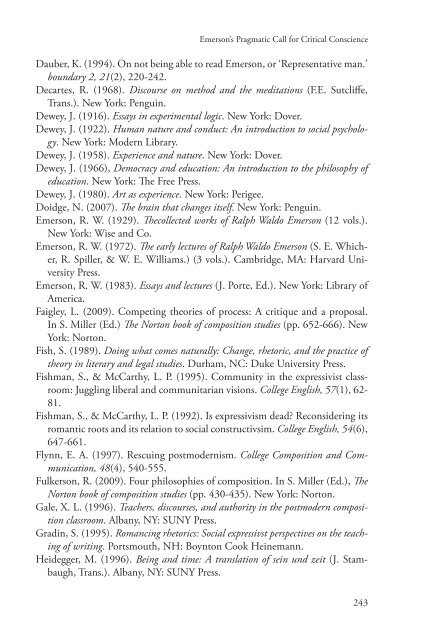Critical Expressivism- Theory and Practice in the Composition Classroom, 2014a
Critical Expressivism- Theory and Practice in the Composition Classroom, 2014a
Critical Expressivism- Theory and Practice in the Composition Classroom, 2014a
Create successful ePaper yourself
Turn your PDF publications into a flip-book with our unique Google optimized e-Paper software.
Emerson’s Pragmatic Call for <strong>Critical</strong> Conscience<br />
Dauber, K. (1994). On not be<strong>in</strong>g able to read Emerson, or ‘Representative man.’<br />
boundary 2, 21(2), 220-242.<br />
Decartes, R. (1968). Discourse on method <strong>and</strong> <strong>the</strong> meditations (F.E. Sutcliffe,<br />
Trans.). New York: Pengu<strong>in</strong>.<br />
Dewey, J. (1916). Essays <strong>in</strong> experimental logic. New York: Dover.<br />
Dewey, J. (1922). Human nature <strong>and</strong> conduct: An <strong>in</strong>troduction to social psychology.<br />
New York: Modern Library.<br />
Dewey, J. (1958). Experience <strong>and</strong> nature. New York: Dover.<br />
Dewey, J. (1966), Democracy <strong>and</strong> education: An <strong>in</strong>troduction to <strong>the</strong> philosophy of<br />
education. New York: The Free Press.<br />
Dewey, J. (1980). Art as experience. New York: Perigee.<br />
Doidge, N. (2007). The bra<strong>in</strong> that changes itself. New York: Pengu<strong>in</strong>.<br />
Emerson, R. W. (1929). Thecollected works of Ralph Waldo Emerson (12 vols.).<br />
New York: Wise <strong>and</strong> Co.<br />
Emerson, R. W. (1972). The early lectures of Ralph Waldo Emerson (S. E. Whicher,<br />
R. Spiller, & W. E. Williams.) (3 vols.). Cambridge, MA: Harvard University<br />
Press.<br />
Emerson, R. W. (1983). Essays <strong>and</strong> lectures (J. Porte, Ed.). New York: Library of<br />
America.<br />
Faigley, L. (2009). Compet<strong>in</strong>g <strong>the</strong>ories of process: A critique <strong>and</strong> a proposal.<br />
In S. Miller (Ed.) The Norton book of composition studies (pp. 652-666). New<br />
York: Norton.<br />
Fish, S. (1989). Do<strong>in</strong>g what comes naturally: Change, rhetoric, <strong>and</strong> <strong>the</strong> practice of<br />
<strong>the</strong>ory <strong>in</strong> literary <strong>and</strong> legal studies. Durham, NC: Duke University Press.<br />
Fishman, S., & McCarthy, L. P. (1995). Community <strong>in</strong> <strong>the</strong> expressivist classroom:<br />
Juggl<strong>in</strong>g liberal <strong>and</strong> communitarian visions. College English, 57(1), 62-<br />
81.<br />
Fishman, S., & McCarthy, L. P. (1992). Is expressivism dead? Reconsider<strong>in</strong>g its<br />
romantic roots <strong>and</strong> its relation to social constructivsim. College English, 54(6),<br />
647-661.<br />
Flynn, E. A. (1997). Rescu<strong>in</strong>g postmodernism. College <strong>Composition</strong> <strong>and</strong> Communication,<br />
48(4), 540-555.<br />
Fulkerson, R. (2009). Four philosophies of composition. In S. Miller (Ed.), The<br />
Norton book of composition studies (pp. 430-435). New York: Norton.<br />
Gale, X. L. (1996). Teachers, discourses, <strong>and</strong> authority <strong>in</strong> <strong>the</strong> postmodern composition<br />
classroom. Albany, NY: SUNY Press.<br />
Grad<strong>in</strong>, S. (1995). Romanc<strong>in</strong>g rhetorics: Social expressivst perspectives on <strong>the</strong> teach<strong>in</strong>g<br />
of writ<strong>in</strong>g. Portsmouth, NH: Boynton Cook He<strong>in</strong>emann.<br />
Heidegger, M. (1996). Be<strong>in</strong>g <strong>and</strong> time: A translation of se<strong>in</strong> und zeit (J. Stambaugh,<br />
Trans.). Albany, NY: SUNY Press.<br />
243


















